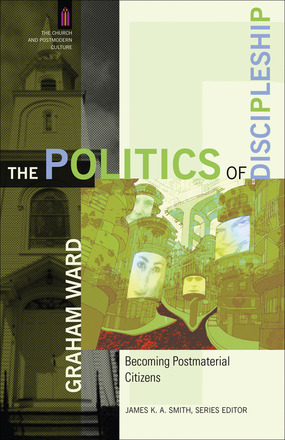Graham Ward’s The Politics of Discipleship, reviewed by Amos Yong
 Graham Ward, The Politics of Discipleship: Becoming Postmaterial Citizens, The Church and Postmodern Culture Series (Grand Rapids: Baker Academic, 2009), 317 pages, ISBN 9780801031588.
Graham Ward, The Politics of Discipleship: Becoming Postmaterial Citizens, The Church and Postmodern Culture Series (Grand Rapids: Baker Academic, 2009), 317 pages, ISBN 9780801031588.
For most readers of The Pneuma Review, this will not be an easy book to read. Graham Ward, professor of contextual theology and ethics at the University of Manchester in the United Kingdom, writes with a density and against a backdrop of contemporary philosophical debates that will simply be impenetrable to those without a graduate level theological education. Be that as it may, the argument developed here, an extension of a much larger project Ward has now prosecuted in the many other books he has written over the last dozen or so years, deserves attention by those in the renewal movement who are concerned about Christian discipleship in the twenty-first century.
In brief, the two central theses of this volume, captured in its title, is that all Christian discipleship has a political character, and the call to discipleship in our time involves the embodiment of a postmaterial form of life. Postmaterialism, Ward suggests, is a counter-cultural posture that not only resists the materialistic consumption of an unbridled capitalist way of life but also rejects the de-materialized virtual reality inhabited by an increasing percentage of the contemporary world. The former materialist mentality is hedonistic and self-absorbed, while the latter dematerialist trend perverts the embodied and material nature of men and women created as good in the divine image. The response, then, ought to be a postmaterialist theology, even metaphysics – as opposed to the claims regarding ours being a post-metaphysical era which actually masks the deployment of bad or destructive metaphysical assumptions- of the body, both at the personal level of intersubjective relationships and at the political level of ecclesial-social interactions.
Renewal church leaders and even scholars may contrast material with spiritual, thus assuming that a postmaterial citizen is one who is (in their mind) oriented toward the spiritual, other, or next world. Ward is indeed focused on what he calls throughout his book “the eschatological remainder,” the incompleteness of Christ-with-us in history and the heralding of partially present but yet to-appear-in-the-future kingdom. However, while this eschatological remainder names what we hope for, it is different from a false optimism that claims to fully know such hopes; instead, hope is shaped in part by what we don’t know. Thus the eschatological remainder serves as an apophatic check on our kataphatic theological commitments. Yet this eschatologically rich theological vision is clear also to highlight, because of Ward’s emphasis on a theology of the body, the very concrete, palpable, and political nature of Christian discipleship. To dwell in Christ (as St. Paul has it) is also to have Christ dwelling in us as embodied, social, economic, and political creatures, with embodied, social, economic, and political interactions with those around us. Thus to be disciples is to act out the way of Christ in the world, precisely the nature of public and political life. Being postmaterial therefore does not mean being spiritually minded if such involves being of no earthly good; on the contrary, being postmaterially and spiritually engaged with discipleship involves political witness, interaction, and engagement.
Category: In Depth, Pneuma Review, Spring 2011


